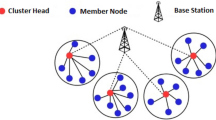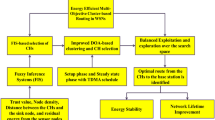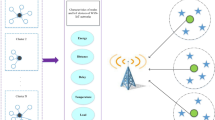Abstract
Due date of data delivery is a key factor in timeliness-crucial wireless sensor networks (e.g. battlefield sensor networks, cyber-physical systems, and wireless multimedia sensor networks). Data aggregation is a well-known methodology to reduce transmission time. However, the decrease of transmission time does not definitely mean increasing the ratio of data delivery on time from the view of the whole network. In this paper, we studied how to minimize tardiness in data aggregation scheduling in consideration of due date for single-hop wireless sensor networks. Each data sensor has its own due date and data size. Tardiness penalty is induced if the finish time of data transmission is later than its due date for a data sensor. The scheduling problem is firstly formulated. A dynamic programming algorithm (DPS) is proposed for the problem which the data sizes of all data sensors are the same. A forward shift heuristic algorithm (FSH) and a variable neighborhood search heuristic algorithm (VSNH) are proposed to minimize the total transmission tardiness. Simulation experiments show that FSH outperforms the earliest deadline first and delay minimization aggregation algorithms. VSNH starting from the output of DPS is the best scheduling algorithm to solve the data aggregation scheduling problem with the objective of minimizing total transmission tardiness.











Similar content being viewed by others
References
Liang, J., & Liang, Q. (2011). Design and analysis of distributed radar sensor networks. IEEE Transaction on Parallel and Distributed Processing, 22(11), 1926–1933.
Ren, Q., & Liang, Q. (2008). Throughput and energy-efficiency aware ultra wideband communication in wireless sensor networks: A cross-layer approach. IEEE Transactions on Mobile Computing, 7(7), 805–816.
Su, S., & Yu, H. (2013). Secure and efficient data collection in wireless image sensor network based on ellipse batch dispersive routing. Special Issue on Security in Big Data: Security and Communication Networks.
Willig A., & Uhlemann, E. (2014). Deadline-aware scheduling of cooperative relayers in TDMA-based wireless industrial networks. Wireless Networks, 20(1), 73–88.
Zhang, H., Ma, H., Li, X. Y., Tang, S., & Xu, X. (2012). Energy-efficient scheduling with delay constraints for wireless sensor networks: A calculus-based perspective. Computer Communications, 35, 1983–1993.
Li, R., & Eryilmaz, A. (2012). Scheduling for end-to-end deadline-constrained traffic with reliability requirements in multihop networks. IEEE/ACM Transactions on Networking, 20(5), 1649–1662.
Chipara, O., Lu, C., & Roman, G. C. (2013). Real-time query scheduling for wireless sensor networks. IEEE Transaction on Computers, 62(9), 1850–1865.
Broder A., & Mitzenmacher, M. (2002). Optimal plans for aggregation. In The 21st annual symposium on principles of distributed computing (PODC) (pp. 144–152).
Chen, X., Hu, X., & Zhu, J. (2005). Minimum data aggregation time problem in wireless sensor networks .In X. Jia, J. Wu, & Y. He (Eds.), MSN, LNCS (Vol. 3794, pp. 133–142).
Huang, S.C.H., Wan, P.J., Vu, C.T., Li, Y., & Yao, F. (2007). Nearly constant approximation for data aggregation scheduling in wireless sensor networks. In INFOCOM (pp. 366–372).
Xu, X., Li, X. Y., Mao, X., Tang, S., & Wang, S. (2011). A delay-efficient algorithm for data aggregation in multihop wireless sensor networks. IEEE Transaction on Parallel and distributed systems, 22(1), 163–175.
Wang, P., He, Y., & Huang, L. (2013). Near optimal scheduling of data aggregation in wireless sensor networks. Ad Hoc Networks, 11, 1287–1296.
Zheng, R., & Barton, R. J. (2007). Toward optimal data aggregation in random wireless sensor networks. In INFOCOM (pp. 249–257).
Qin, H., & Qiu, L. (2008). Task scheduling for data aggregation in fault-tolerant wireless sensor networks. In IEEE international conference on SMC (pp. 3326–3331).
Joo, C., Choi, J.G., & Shroff, N. B. (2010). Delay performance of scheduling with data aggregation in wireless sensor networks. In INFOCOM.
Yu, B., & Li, J. (2011). Making aggregation scheduling usable in wireless sensor networks: an opportunistic approach. In IEEE 8th international conference on mobile ad hoc and sensor systems (MASS) (pp. 666–671).
Bagaa M., Derhab A., Lasla N., Ouadjaout A., & Badache, N. (2012). Semi-structured and unstructured data aggregation scheduling in wireless sensor networks. In INFOCOM (pp. 2671–2675).
Tian, C., Jiang, H., Wang, C., Wu, Z., Chen, J., & Liu, W. (2011). Neither shortest path nor dominating set: aggregation scheduling by greedy growing tree in multihop wireless sensor networks. IEEE Transactions on Vehicular Technology, 60(7), 3462–3472.
Ye, Z., Abouzeid, A. A., & Ai J. (2007). Optimal policies for distributed data aggregation in wireless sensor networks. INFOCOM (pp. 1676–1684)
Li Y., Guo L., & Prasad, S. K. (2010). An energy-efficient distributed algorithm for minimum-latency aggregation scheduling in wireless sensor networks. In IEEE 30th international conference on distributed computing systems (ICDCS) (pp. 827–836).
Díaz-Anadón, M. O., & Leung, K. K. (2011). TDMA scheduling for event-triggered data aggregation in irregular wireless sensor networks. Computer Communications, 34(17), 2072–2081.
Becchetti, L., Marchetti-Spaccamela, A., Vitaletti, A., Korteweg, P., Skutella, M., & Stougie, L. (2009). Latency constrained aggregation in sensor networks. ACM Transaction on Algorithms, 6(1), 13–20.
Brucker, P. (2006). Scheduling algorithms (5th ed., pp. 267–271). Berlin: Springer.
Brucker, P., & Kovalyov, M. Y. (1996). Single machine batch scheduling to minimize the weighted number of late jobs. Mathematical Methods of Operations Research, 43(1), 1–8.
Du, J., & Leung, J. Y. T. (1990). Minimizing total tardiness on one machine is NP-hard. Mathematics of Operations Research, 15(3), 483–495.
Hansen P., & Mladenović, N. (1999). An introduction to variable neighborhood search. Berlin: Springer (pp. 433–458).
Hansen, P., & Mladenović, N. (2001). Variable neighborhood search: Principles and applications. European Journal of Operational Research, 130(3), 449–467.
Rezgui, J., Hafid, A., Ali, R. B., & Gendreau, M. (2012). Optimization model for handoff-aware channel assignment problem for multi-radio wireless mesh networks. Computer Networks, 56(6), 1826–1846.
Stoyenko, A., & Georgiadis, L. (1992). On optimal lateness and tardiness scheduling in real-time systems. Computing, 47, 215–234.
Acknowledgments
This research was supported by the National Natural Science Foundation of China under Grant No. 60904072, 71301018; the Doctoral Foundation of the Youth Teachers of Ministry of Education of China under Grant No. 20090185120002; the Humanities and Social Sciences Foundation for the Youth of Ministry of Education of China under Grant No. 09YJC630018; the UESTC Fundamental Research Funds for the Central Universities of China under Grant No. 103.1.2 E022050205.
Author information
Authors and Affiliations
Corresponding author
Rights and permissions
About this article
Cite this article
Su, S., Yu, H. Minimizing tardiness in data aggregation scheduling with due date consideration for single-hop wireless sensor networks. Wireless Netw 21, 1259–1273 (2015). https://doi.org/10.1007/s11276-014-0853-4
Published:
Issue Date:
DOI: https://doi.org/10.1007/s11276-014-0853-4




